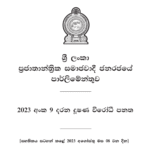Supreme Court Appeal No. 108/2022 – Analysis
Background
• District Court (DC Bandarawela – Case No. L 1866):
Plaintiff W.M. Bandara Menika filed action seeking recovery of possession of a property from her son-in-law (1st Defendant) and others who entered the property through him. The District Court dismissed both the Plaintiff’s plaint and the Defendants’ claim in reconvention, mischaracterizing the action as a rei vindicatio.
• High Court Civil Appellate (UVA/HCCA/BDL/42/19(f)):
Overturned the DC judgment. Recognized the relationship as licensor-licensee, not owner-in-possession versus trespasser.
• Supreme Court Appeal:
Brought by 2nd and 3rd Defendants against the High Court’s ruling.
⸻
Key Legal Issues
1. Nature of the Action – Rei Vindicatio or Licensor-Licensee?
The central issue was whether the inclusion of a prayer for declaration of title transformed an otherwise license-based ejectment action into a rei vindicatio, thereby requiring strict proof of ownership.
Supreme Court’s Finding:
• Citing Pathirana v. Jayasundara (58 NLR 169):
A plaintiff can include a declaration of title in an ejectment action without making it a rei vindicatio.
• The Plaintiff’s case was grounded in contractual privity, i.e., a license granted to her son-in-law (1st Defendant), who then introduced the 2nd and 3rd Defendants.
• Evidence and pleadings established the licensor-licensee relationship.
• Section 116 of the Evidence Ordinance applies: a licensee cannot deny the title of the licensor.
2. Misapplication by the District Court
• The District Judge misdirected himself by treating the claim as rei vindicatio solely because of the prayer for a declaration of title.
• Failed to consider evidence and pleadings that supported a license-based relationship and wrongful overholding.
3. No Cross-Appeal
• The defendants did not challenge the District Court’s finding that the 1st Defendant was a licensee.
• Therefore, that finding stood unchallenged and triggered estoppel under Section 116.
⸻
Key Doctrines Reaffirmed
• Licensor-Licensee Relationship:
Possession obtained via license cannot be turned into adverse possession unless license is explicitly revoked and possession is withheld.
• Section 116 of Evidence Ordinance:
Precludes licensees from disputing the title of the licensor.
• Distinction Between Rei Vindicatio and Licensee Ejectment Actions:
• Rei vindicatio requires strict proof of title.
• Licensee ejectment is based on contractual grounds; estoppel applies.
⸻
Outcome
• Supreme Court Answered Both Leave Questions in the Negative:
1. High Court did not err in applying Section 116.
2. Inclusion of a prayer for declaration of title does not convert the action into rei vindicatio.
• Appeal Dismissed with Costs.
⸻
Significance
• Clarifies procedural and evidentiary boundaries between different property-based actions.
• Affirms protective scope of Section 116 in Sri Lankan property law, especially in familial arrangements where formal written agreements are often absent.
• Reinforces that the substance of pleadings, not the label, determines the legal nature of the action.













